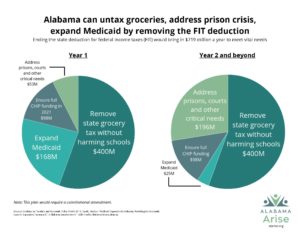The Alabama Legislature has yet to decide how to fund health coverage for more than 170,000 children next year. And that’s a symptom of a fundamental illness that has plagued our state’s budgets for decades.
The Children’s Health Insurance Program (CHIP) is one of Alabama’s most successful programs. Through Medicaid and ALL Kids, CHIP supports health coverage for 14% of Alabama’s children. Alabama’s 1997 adoption of CHIP and its later decision to expand eligibility to children in households that make up to 317% of the federal poverty level (nearly $68,000 for a family of three) has made our state a leader on children’s health coverage in the South.
Alabama’s investment in CHIP ensures that kids can get the health care they need to learn and thrive. And CHIP is a great deal for our state. For every $1 Alabama spends on CHIP, the federal government provides more than $3 in matching money. (CHIP parents pay an annual fee and copays that can’t total more than 5% of their annual income.)
Unfortunately, Alabama often struggles to provide its share of CHIP funding, even during a “good” budget year. Gov. Kay Ivey recommended that CHIP’s state match for 2020 be paid out of the Education Trust Fund (ETF), which receives most of the “growth tax” revenue from sales and income taxes. But the Senate balked at this idea and removed CHIP from the ETF budget it passed last week. Meanwhile, the General Fund budget that the House passed in April also includes no CHIP funding.
In the next couple of weeks, both chambers are expected to take up the budget that the other one passed. In the meantime, the parents of more than 170,000 Alabama children wait to learn whether their kids will still have health insurance this fall.
It’s time to stop lurching from one crisis to another
CHIP is one of Alabama’s most popular programs, and we fully expect the House and Senate to fund it. But the uncertainty illustrates the central problem of Alabama’s budgets: We don’t bring in enough money to meet basic needs. In past years, Medicaid has been the subject of funding crises. This year, the threat of a federal lawsuit over abominable conditions in state prisons may force a special session. And in 2021, CHIP may be at risk as a temporary boost to the federal matching rate ends.
Every year, Alabama seems to have at least one essential service that it struggles to fund adequately. And every year, the Legislature juggles too little money, robs Peter to pay Paul, or grasps at another source of one-time funding to squeak through another year. Barely maintaining the status quo is no way to promote shared prosperity. And it’s no way to make life better for everyday Alabamians.
Alabama Arise has a solution to break the cycle of uncertainty and invest in our state’s future. And it’s a solution that’s beginning to interest lawmakers as they consider how to pay for CHIP, Medicaid, corrections and other necessities.
Ending the FIT deduction would strengthen Alabama’s future
That solution is to end Alabama’s income tax deduction for federal income taxes (FIT). It’s a loophole that only two other states – Iowa and Louisiana – allow in full. (Three other states allow a partial deduction.) And it’s a skewed tax break that primarily benefits the richest households among us.
For those who earn $30,000 a year, the FIT deduction saves them about $27 on average. But for the top 1% of taxpayers, it’s worth an average of more than $11,000 a year. Closing this tax loophole would bring our state’s upside-down tax system closer to balance. It also would allow Alabama to end the state sales tax on groceries without cutting school funding.

Ending the FIT deduction would bring in an additional $719 million a year. That’s enough to pay for Medicaid expansion, secure long-term CHIP funding and invest in education, corrections and other pressing needs.
And this new revenue wouldn’t be just one-time money. It would be there every year to help Alabama meet the needs of the state and its people.
As one legislator told us recently: “This is the only plan that makes sense.” We think so, too, and we’re working hard to convince more lawmakers that they need to support this proposal, for the sake of our children’s health and for all of us.

